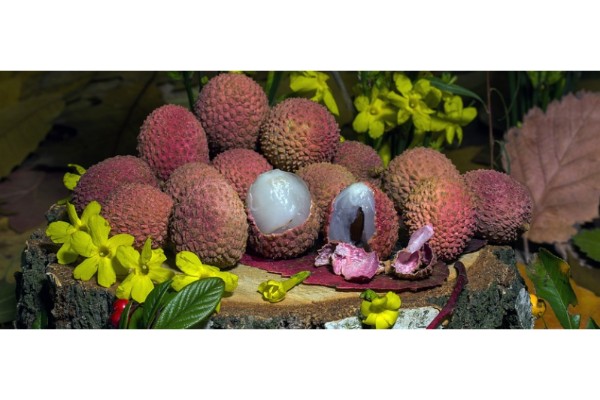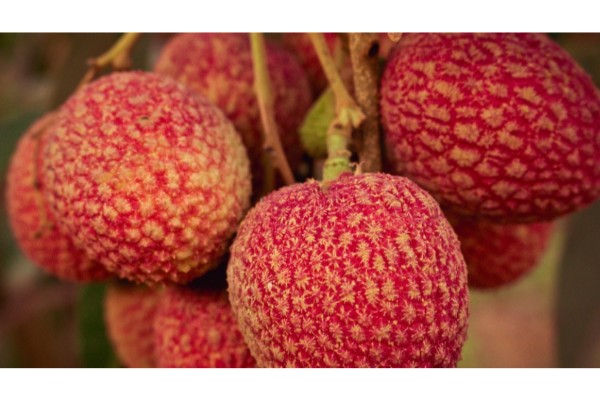Dogs can occasionally eat lychee as a treat if the fruit is ripe and the pit and outer skin have been removed. As a source of fiber and nutrients, lychee can be beneficial to the health of your dog in small doses. Although eating too much lychee can cause stomach upset because of the fruit’s high sugar content.
Table of Contents
What Is Lychee?
The soapberry family includes the tropical fruit lychee. Litchi chinensis is the name given to this fruit in scientific literature. It is somewhat distinctive because it is the sole member of its genus. Lychees are primarily grown in China and India. But these fruits can also be found in tropical and subtropical regions of the world, such as Vietnam, South Africa, Pakistan, Mexico, and some regions of the United States.
Ripe lychee has a round leathery skin that is pink or reddish-brown in color and looks bumpy, like a strawberry. The edible portion of the lychee is its white, juicy flesh, which has a flavor that is a cross between grape and pear. Its popularity among humans is rising, along with that of some other uncommon fruits like the jackfruit. But how about our furry friends?
Can Dogs Eat Lychee?

After removing the outer skin and seed, the answer is yes, dogs can consume lychee fruits in small amounts. Only give your pet ripe lychee fruits because unripe ones are toxic and can result in a dangerous drop in blood sugar levels. Lychee is a nutritious and fiber-rich snack. To avoid a choking risk, always remove the lychee seed and outer skin. Choose fresh lychee fruit; avoid giving your dog lychee jelly or canned lychee because they are loaded with extra sugar.
3 Risks Of Feeding Dogs Lychee
While lychee can be a beneficial treatment for your dog when given in moderation, there are risks to take into account before including it in homemade dog food or giving it to them as a treat. Lychee fruits are:
1. A choking hazard: Your dog could suffocate on the lychee seed and peel. Always give your dog peeled and pitted lychee fruit because eating the whole fruit whole can result in an intestinal blockage.
2. High in sugar: The high sugar content of lychee may be detrimental to the general health of your dog. Sugar in excess can cause your pet to gain weight or have digestive system problems.
3. Toxic when unripe: Methylene cyclopropyl-glycine (MCPG), found in unripe lychee fruits, lowers your dog’s blood sugar levels, resulting in hypoglycemia or, in extreme cases, encephalopathy, a form of brain dysfunction. The poisonous substance saponin, which upsets the stomach, is also present in unripe lychees. Large-scale unripe lychee consumption can have negative health effects. Muscle spasms, dark urine, or excessive drooling are signs of lychee poisoning.
3 Health Benefits Of Lychee For Dogs
Lychee, in moderation, can be a nutritious treat for your pet. Lychee is:
1. High in fiber: Lychee fruits can be included in your dog’s diet to help them consume more fiber. Fiber, when consumed in moderation, can help keep your dog’s digestive system in good shape and ward off problems like constipation or diarrhea.
2. Low in calories: You can give lychee fruits to your pet in small amounts without worrying about them gaining weight because they are a low-calorie snack.
3. Rich in nutrients: The immune system of your pet is supported by the abundance of vitamins, minerals, and antioxidants in lychee. Phosphorus, manganese, potassium, and vitamin C are just a few of the nutrients abundant in the fruit.
How To Safely Feed Lychee To Dogs

Only give ripe lychee to your dog; unripe or green lychee contains toxic chemicals. Before giving your dog lychee fruit, remove the outer skin and pit. Serving your dog large quantities of lychee fruit can cause stomach cramps or other health problems, so only give them a small amount of the fruit’s flesh.
Alternatives To Lychee For Dogs
Technically, dogs can consume a small amount of fresh lychee fruit. However, there are very few studies in this field. When giving a piece of lychee to a dog, owners should exercise caution.
Commercial-based feeds provide dogs with all the nutrients they require. Despite having a high vitamin content, lychee is not necessary to be given for that reason. Giving a fruit substitute that is known to be safer for dogs to eat is probably preferable.
Here are some other treats that your dog may enjoy:
- Raspberries
- Cucumber
- Bananas
Summary
We advise you to speak with your veterinarian before feeding lychee to your pet so they can provide advice specific to the breed of dog you have.
Check to see if the lychee is ripe, then take the skin and seed out. Don’t feed your dog too much of the fleshy part because it can be extremely harmful due to its high sugar content. Instead, only give your dog small amounts of it occasionally. Despite the fact that it is ripe and properly made.
Always keep in mind that lychee fruit’s skin and seed can be poisonous and a choking hazard. Additionally, consult your veterinarian right away if your dog ate an unripe lychee or a lychee seed.
FAQs
Can Dogs Eat Lychee Seeds?
The saponin found in lychee seeds has the potential to be poisonous to both humans and animals. Plants produce saponins, toxic glycosides, as a defense mechanism against insects. They are frequently used to make soaps and detergents because of their well-known capacity to produce a lather in water.
The toxicity of saponins varies a little depending on where they are found. However, if your dog eats a lychee seed, it will probably have an impact on his digestive system. Therefore, even if you choose to give your dog a small amount of fruit as a treat, you should never give them lychee seeds.
Lychee Skin: Edible To Dogs?
There are several reasons why lychee skin may be harmful to our dogs. Compared to the fruit’s actual flesh, it will primarily be much more difficult to digest. In addition, our dogs may choke on this. Furthermore, if your dog does ingest a piece, there is a chance of internal blockages.
Many lychee skins will also still contain small amounts of pesticide residue from the time they were being grown. Even in very small quantities, these pesticides can seriously harm our pets. So refrain from letting your dog consume lychee skin.
My Dog Ate Unripe Lychee: What Should I Do
It’s critical to take immediate action if your dog ate unripe lychee or a lychee seed. You need to get in touch with your veterinarian right away.
Take your dog straight to an emergency vet if your regular veterinarian is unavailable for any reason. Also, let others know exactly what and how much of your dog’s meal they consumed.
Signs To Look Out For
Stomach cramps, vomiting, and diarrhea—which could also be bloody—are the main symptoms to be on the lookout for. Other common signs include:
- Muscle spasms
- Dark urine
- Weight loss
- Drooling
- Head-shaking
- Seizures
